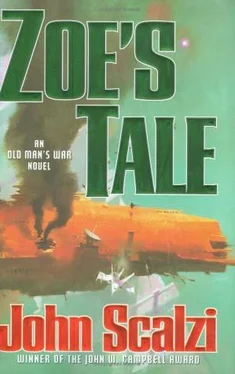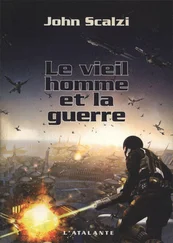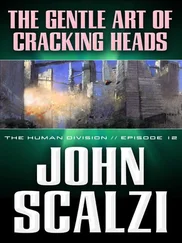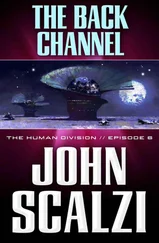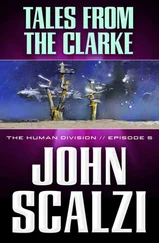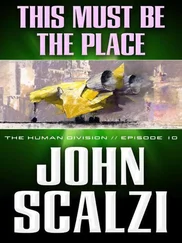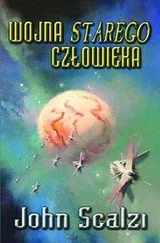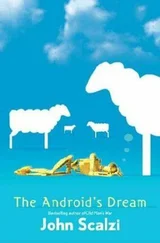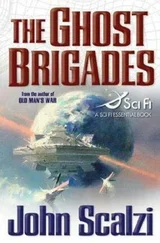Sometimes I don't know if my life is complicated, or if it's that I just think too much about things.
I knelt at the grave, thought some more, and tried to find a way to say a last good-bye to my mother and father and to keep them with me, to stay and to go, to be the daughter and goddess and girl who doesn't know what she wants, all at once, and to belong to everyone and keep myself.
It took a while.
"You seem sad," Hickory said, as we took the shuttle back to Phoenix Station. Dickory sat next to Hickory, impassive as ever.
"I am sad," I said. "I miss my mother and father." I glanced over to John, who was sitting in the front of the shuttle with the pilot, Lieutenant Cloud. "And I think all this moving and leaving and going is getting to me a little bit. Sorry."
"No need to apologize," Hickory said. "This journey has been stressful for us, too."
"Oh, good," I said, turning back to the two of them. "Misery loves company."
"If you would like we would be happy to try to cheer you up," Hickory said.
"Really," I said. This was a new tactic. "How would you do that?"
"We could tell you a story," Hickory said.
"What story?" I asked.
"One that Dickory and I have been working on," Hickory said.
"You've been writing?" I said. I didn't bother to keep the incredulousness out of my voice.
"Is it that surprising?" Hickory said.
"Absolutely," I said. "I didn't know you had it in you."
"The Obin don't have stories of their own," Hickory said. "We learned about them through you, when you had us read to you."
I was puzzled for a minute, and then I remembered: When I was younger I asked Hickory and Dickory to read bedtime stories to me. It was a failed experiment, to say the least; even with their consciousness machines on, neither of them could tell a story to save their lives. The beats were all wrong—they didn't know how to read the emotions in the story is the best way I can put it. They could read the words, all right. They just couldn't tell the story.
"So you've been reading stories since then," I said.
"Sometimes," Hickory said. "Fairy tales and myths. We are most interested in myths, because they are stories of gods and creation. Dickory and I have decided to make a creation myth for the Obin, so we have a story of our own."
"And this is the story you want to tell me," I said.
"If you think it would cheer you up," Hickory said.
"Well, is it a happy creation myth?" I asked.
"It is for us," Hickory said. "You should know you play a part in it."
"Well, then," I said. "I definitely want to hear it now."
Hickory conferred with Dickory quickly, in their own language. "We will tell you the short version," Hickory said.
"There's a long version?" I said. "I'm really intrigued."
"The remainder of the shuttle ride will not be long enough for the long version," Hickory said. "Unless we then went back down to Phoenix. And then back up. And then back down again."
"The short version it is," I said.
"Very well," Hickory said, and began. "Once upon a time—"
"Really?" I said. "'Once upon a time'?"
"What is wrong with 'once upon a time'?" Hickory asked. "Many of your stories and myths start that way. We thought it would be appropriate."
"There's nothing wrong with it," I said. "It's just a little old-fashioned."
"We will change it if you like," Hickory said.
"No," I said. "I'm sorry, Hickory, I interrupted you. Please start again."
"Very well," Hickory said. "Once upon a time . . ."
* * *
Once upon a time there were creatures who lived on a moon of a large gas planet. And these creatures did not have a name, nor did they know they lived on a moon, nor did they know that moon circled a gas planet, nor what a planet was, nor did they know anything in a way that could be said that they were knowing it. They were animals, and they had no consciousness, and they were born and lived and died, all their lives without thought or the knowledge of thought.
One day, although the animals knew nothing of the idea of days, visitors came to the moon that circled the gas planet. And these visitors were known as Consu, although the animals on the planet did not know that, because it was what the Consu called themselves, and the animals were not smart and could not ask the Consu what they called themselves, or know that things could have names.
The Consu came to the moon to explore and they did, noting all the things about the moon, from the air in its sky to the shape of its lands and waters to the shape and manner of all the life that lived in the moon's land, air and water. And when they came to these certain creatures who lived on this moon, the Consu became curious about them and how they lived their lives, and studied them and how they were born and lived and died.
After the Consu had watched the creatures for some time the Consu decided that they would change the creatures, and would give them something that the Consu possessed and that the creatures did not, which was intelligence. And the Consu took the genes of the creatures and changed them so that their brains, as they grew, would develop intelligence well beyond what the creatures would themselves achieve through experience or through many years of evolution. The Consu made these changes to a few creatures and then set them back on the moon and over many generations all the creatures became intelligent.
Once the Consu gave intelligence to the creatures they did not stay on the moon, nor shared themselves with the creatures, but departed and left machines above the sky, which the creatures would not see, to watch the creatures. And so the creatures for a very long time did not learn of the Consu and what they had done to the creatures.
And for a very long time these creatures who now had intelligence grew in number and learned many things. They learned how to make tools and create a language and work together for common goals and to farm the land and mine metals and create science. But although the creatures thrived and learned, they did not know that they among all intelligent creatures were unique, because they did not know there were other intelligent creatures.
One day, after the creatures had gained intelligence, another race of intelligent people came to visit the moon, the first since the Consu, although the creatures did not remember the Consu. And these new people called themselves the Arza and each of the Arza also had a name. And the Arza were amazed that the creatures on the moon, who were intelligent and who had built tools and cities, did not have a name and did not have names for each of their number.
And it was then the creatures discovered through the Arza what made them unique: They were the only people in all the universe who were not conscious. Although every creature could think and reason, it could not know itself as every other intelligent creature could know itself. The creatures lacked awareness of who they were as individuals, even as they lived and thrived and grew on the face of the moon of the planet.
When the creatures learned this, and although no individual could know it felt this, there grew within the race of these creatures a hunger for that thing they did not have: for the consciousness that the creatures knew collectively they did not have as individuals. And this is when the creatures first gave themselves a name, and called themselves "Obin," which in their language meant "The ones who lack," although it might be better translated as "The deprived ones" or "The ones without gifts," and although they named their race they did not give names to each of their individual number.
And the Arza took pity on the creatures who now called themselves Obin, and revealed to them the machines that floated in the sky and that were put there by the Consu, who they knew to be a race of immense intelligence and unknowable aims. The Arza studied the Obin and discovered that their biology was unnatural, and so the Obin learned who had created them.
Читать дальше
